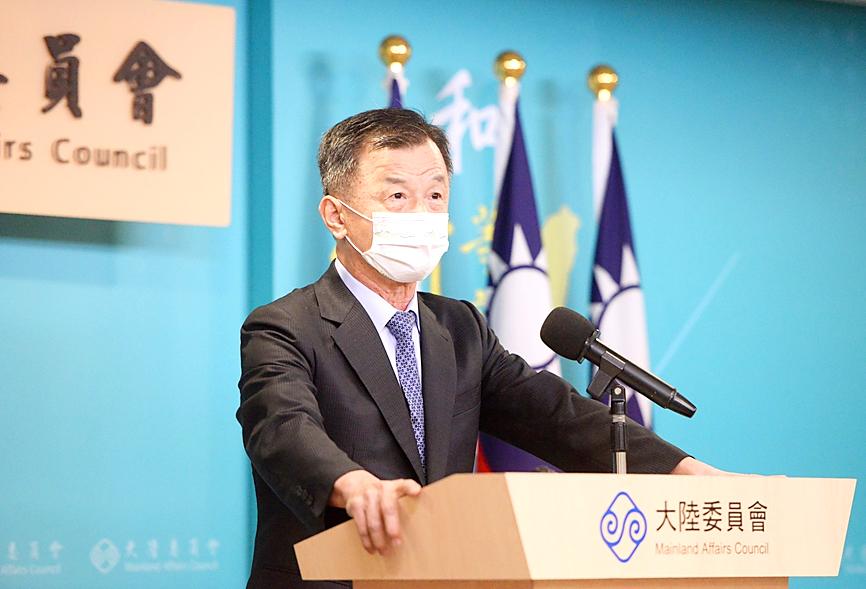The Mainland Affairs Council (MAC) yesterday accused the “increasingly authoritarian” Chinese Communist Party (CCP) of threatening global democracy, after Chinese President Xi Jinping (習近平) in his centenary address touted the party’s accomplishments and commitment to restoring “territorial integrity.”
Donning a Mao suit before a crowd of 70,000 at Beijing’s Tiananmen Square, Xi praised the CCP for lifting millions out of poverty in the 100 years since its founding. He also upheld the “one China” principle and the so-called “1992 consensus” as a means toward peaceful unification with Taiwan.
“Solving the Taiwan question and realizing the complete reunification of the motherland are the sworn historical duties of the CCP and the common aspiration of all Chinese people,” he said, urging people on both sides of the Taiwan Strait to “smash any ‘Taiwanese independence’ plots.”

Photo: Chen Yu-fu, Taipei Times
The “1992 consensus” — a term that former MAC chairman Su Chi (蘇起) in 2006 admitted making up in 2000 — refers to a tacit understanding between the Chinese Nationalist Party (KMT) and the CCP that both sides of the Taiwan Strait acknowledge that there is “one China,” with each side having its own interpretation of what “China” means.
While conceding that the CCP has achieved “certain economic development” by adopting a Western free-market system, the council condemned the party for “strangling democracy and violating human rights.”
Under the pretext of national rejuvenation, the CCP is becoming “increasingly authoritarian,” while turning its back on private enterprise, it said.
Externally, it has revealed its hegemonic aspirations, while attempting to disrupt the international order, it added.
“The CCP’s historical policy blunders and persistent harmful actions pose a grave threat to regional security and global liberal democracy,” the council said.
The CCP must reflect on its mistakes and promote democratic reforms as soon as possible to return political power to the people, it said.
It must also stop bullying the weak and become a responsible party to regional peace, it added.
Responding to Xi’s calls for unification, the council urged Beijing to “face up to the reality” that 23 million Taiwanese have long rejected its unilateral “one China” principle and “1992 consensus.”
Only by abandoning intimidation and political frameworks can the two sides maintain healthy and sustainable interaction, it added.
The Taiwan Public Opinion Foundation yesterday released the results of its first-ever “feeling thermometer” poll, designed to gauge public sentiment toward the CCP.
Foundation chairman Michael You (游盈隆) said it is the first time the political science tool has been applied to the issue.
The poll asked respondents to rank their sentiment toward the CCP from 0 to 100, in which 0 represents the strongest dislike and 50 represents either indifference or no feelings.
Forty-seven percent responded with a ranking of less than 50, while 10.1 percent answered higher than 50, 31.9 percent answered 50 and 11.1 percent declined to respond or said they did not know.
The poll shows that the overwhelming majority of Taiwanese have either negative or no feelings toward the CCP, You said.
This remained true regardless of political orientation, age, gender, education, income level and other demographics, including KMT supporters and those whose families came to Taiwan after 1949, he added.
The telephone survey, conducted from June 15 to 19, collected 1,072 valid responses from respondents aged 20 or older. It has a confidence level of 95 percent and margin of error of 2.99 percentage points.

POSITIVE DEVELOPMENT: Japan and the US are expected to hold in-depth discussions on Taiwan-related issues during the meeting next month, Japanese sources said The holding of a Japan-US leaders’ meeting ahead of US President Donald Trump’s visit to China is positive news for Taiwan, former Japan-Taiwan Exchange Association representative Hiroyasu Izumi said yesterday. After the Liberal Democratic Party’s landslide victory in Japan’s House of Representatives election, Japanese Prime Minister Sanae Takaichi is scheduled to visit the US next month, where she is to meet with Trump ahead of the US president’s planned visit to China from March 31 to April 2 for a meeting with Chinese President Xi Jinping (習近平). Japan and the US are expected to hold in-depth discussions on Taiwan-related issues during the

‘LIKE-MINDED PARTNER’: Tako van Popta said it would be inappropriate to delay signing the deal with Taiwan because of China, adding he would promote the issue Canadian senators have stressed Taiwan’s importance for international trade and expressed enthusiasm for ensuring the Taiwan-Canada trade cooperation framework agreement is implemented this year. Representative to Canada Harry Tseng (曾厚仁) in an interview with the Central News Agency (CNA) said he was increasingly uneasy about Ottawa’s delays in signing the agreement, especially as Ottawa has warmed toward Beijing. There are “no negotiations left. Not only [is it] initialed, we have three versions of the text ready: English, French and Mandarin,” Tseng said. “That tells you how close we are to the final signature.” Tseng said that he hoped Canadian Prime Minister Mark Carney

President William Lai (賴清德) yesterday bestowed one of Taiwan’s highest honors on Saint Vincent and the Grenadines (SVG) Ambassador Andrea Clare Bowman in recognition of her contributions to bilateral ties. “By conferring the Order of Brilliant Star with Grand Cordon on Ambassador Bowman today, I want to sincerely thank her, on behalf of the Taiwanese people, for her outstanding contribution to deepening diplomatic ties between Taiwan and SVG,” Lai said at a ceremony held at the Presidential Office in Taipei. He noted that Bowman became SVG’s first ambassador to Taiwan in 2019 and

A man walks past elementary school artworks at the Taipei Lantern Festival in Ximen District yesterday, the first day of the event. The festival is to run from 5pm to 10pm through March 15.